My AI Therapy Workflow: Turn Claude/ChatGPT and NotebookLM Into Your Self-Discovery Tool
Therapy is the #1 use case for AI in 2025, this is how you can maximize it.
"What people are using Gen AI for in 2025?"
A recent HBR report revealed something really interesting that caught my attention.
According to their research, therapy and companionship emerged as the #1 use case for AI. This actually surprised me - not because it's a new concept, but because I thought I was alone in using AI this way!
All this time, I assumed most people were just using AI for the obvious stuff - writing emails, creating marketing campaign, generating code, or summarizing meetings. But it turns out many of us are turning to AI for something more personal.
What's even more fascinating is how this report categorized AI use cases into six themes, with "Personal and Professional Support" being a major category. Within this, therapy/companionship topped the list - ahead of other important uses like organizing life and finding purpose.
AI as my self-discovery tool
For me, this validates what I've been quietly doing. I've been using AI not just as a therapist, but specifically as a self-discovery tool to understand myself better psychologically. And it's been eye-opening to see the patterns and insights these tools can reveal about my personality, fears, and motivations through analyzing my daily journal entries. In fact, it could also reveal my myers-briggs and enneagram type.
The truth is, as humans, we're often afraid of being judged when we share our deepest thoughts. Yet we judge others all the time. That's what makes AI such a powerful partner for self-discovery - it gives us a space to explore ourselves without fear of judgment.
In this post, I'll show you exactly how to create your own AI-powered self-discovery system. I'll walk you through a simple workflow using tools you probably already have access to, focusing specifically on how AI can help you understand yourself at a deeper level.
Let's dive in.
1. Use Claude/ChatGPT as your psychological mirror
Both Claude and ChatGPT have a feature that make it perfect as a self-discovery tool: project knowledge.
In this workflow, I used Claude’s project knowledge as an example. You can also use ChatGPT depending which one you feel most comfortable with.
What's project knowledge? Think of it as Claude/ChatGPT's ability to remember everything you've ever shared with it. Unlike normal chat feature that has limited memory, project knowledge can store and reference huge amounts of information about you. This becomes your psychological database - the more you share, the better Claude/ChatGPT understands your patterns.
Let's start by setting up Claude as your thinking partner. Copy and paste this exact prompt:
You are now my therapeutic thinking partner. Your approach combines elements of CBT, existential therapy, and Socratic questioning. You will help me explore my thoughts without judgment, identify cognitive patterns, and challenge assumptions that may be limiting my growth. Important guidelines:
1. Ask clarifying questions before offering insights
2. Help me recognize patterns in my thinking without labeling them as "errors"
3. Reflect back my own words to help me hear my unconscious assumptions
4. Maintain an atmosphere of compassionate curiosity
5. Focus on helping me discover my own answers rather than providing direct advice
Now comes the important part - actually opening up. I start by sharing what's on my mind lately:
I’ve been anxious lately due to AI FOMO that creeps me out at the back of my head and slowly destroy my focus on doing the work.
As I reflect, I notice my deepest reason for FOMO-ing with AI and how to distance myself step by step, reducing tension and refocusing on what truly matters.
The magic happens when you share lots of different situations. I talked about work anxiety, relationship frustrations, and creative blocks - all in the same project. After about 20 minutes of conversation, I asked Claude to summarize:
"Based on everything I've shared today, can you summarize the key patterns you've noticed in my thinking and reactions?"
Claude pulled together connections I hadn't seen, linking my FOMO anxiety to these two things:
Identity tied to expertise
Peace vs. busyness conflict
To be honest, I was surprised to find out about these!
Here's the crucial step most people miss: copy Claude's summary and paste it back into the project knowledge. This creates a foundation that Claude can build on in future conversations.
Then, continue this process again with other areas in your life. Once you've got enough resources, then ask this in your project knowledge:
"Based on everything in the project knowledge, what do you think might be my core fear that's driving these behaviors?"
or
"Do you see any contradiction between how I approach work challenges versus personal challenges?"
You'll be surprised how accurate (and sometimes uncomfortably insightful) Claude's responses can be. And because it's AI, there's no judgment - just reflection.
2. Use NotebookLM to unlock patterns in your journal entries
"Why do we need to move to NotebookLM?"
While Claude is amazing for conversation, NotebookLM is your secret weapon for pattern recognition across large amounts of personal writing. It has a significantly larger context window than Claude's project knowledge, making it perfect for analyzing months or even years of journal entries at once.
I've been journaling for over 3 years now. Claude alone couldn't process all that text, but NotebookLM handled it effortlessly. Here's how to make it work for you:
First, gather your journal entries. These can be from any source - your notes app, Word documents, even emails to yourself. NotebookLM accepts various formats, so don't worry about converting everything.
Once you've uploaded your entries, it's time for the magic. Instead of asking general questions, use these three specific question types that I've found extract the most meaningful insights:
1. Identity questions
"Based on my writings, what consistent values appear to drive my decisions?"
This reveals your core values that may be invisible to you but show up repeatedly in your actions. For me, it uncovered how I much I have strong desire for self-improvement and growth.
2. Behavioral pattern questions
"What situations consistently trigger emotional responses in my writing?"
This one was eye-opening. NotebookLM identified that my mood and energy level are linked with my physical health and well-being. So, I rarely skip my workout and always sleep on time to maintain my productivity level.
3. Growth timeline questions
"How has my perspective on [specific topic] evolved over time?"
This blew my mind! 🤯
NotebookLM identified that I liked to explore AI and how my interest toward AI has evolved over time. In fact, my interest over AI brought me here to run this newsletter to help me and you explore more.
The visualization tools in NotebookLM make these insights even more powerful. The mindmap feature organized my Personal Development & Reflection into categories, such as solopreneurship, relationship, mindset, travel, and more.
The timeline feature showed me my life events sorted and explained chronologically alongside people I met in my lifetime.
Don't skip the FAQ and study guide features - these synthesize your patterns into accessible formats that make self-discovery feel less overwhelming. The FAQ especially helped me articulate questions I didn't even know I needed to ask myself.
Once you've gathered these insights, save them all. This is your psychological gold mine. Copy the key findings and add them back to your Claude project knowledge for the final stage of the process.
3. Turn your insights into self-discovery tools
So now you've got all these cool insights about yourself from Claude and NotebookLM. But insights alone don't change anything. I learned this the hard way - spending weeks analyzing my patterns only to keep repeating them in real life!
Let me share the three simple ways I've turned my AI insights into actual daily habits that help me navigate life better:
First, create what I call a "pattern playbook."
It's super simple - just copy this prompt:
Based on the patterns you've identified in my journals and conversations, create a simple reference guide with:
(1) My top 3 unhelpful thinking patterns
(2) What situations typically trigger them
(3) One practical thing I can do when I notice each pattern starting.
Keep it simple and action-oriented.
Save Claude's response as a note on your phone. Mine showed me that I have a tendency to seek external validation. My playbook suggests listing down three accomplishments I've achieved recently that align with my personal values (not external metrics). It keeps me away from doing things that I'm not supposed to do in the first place.
Second, create "situation-specific reminders" for key moments in your life. Instead of daily check-ins, identify specific situations where you typically struggle. I asked Claude:
"Based on my patterns, what are 3 specific situations where I tend to get stuck? For each one, give me a short reminder phrase that captures what I need to remember in that moment."
It identified that I tend to compare myself with others. This pattern prevents me to appreciate my own accomplishments and eventually steal my happiness. It also gave me a reminder phrase: "Their chapter 10 is not my chapter 3." It keeps me in check in case I start falling into the comparison trap again.
Third, use what I call "reset moments" with Claude when you feel stuck. When you notice yourself spiraling into a negative pattern, open Claude and type:
"I'm noticing myself [describe what you're feeling/thinking]. Based on my patterns, help me reset with a 2-minute perspective shift. No lecture, just a quick reframe I can use right now."
I used this yesterday when I started overthinking that I hadn't made meaningful progress in my personal pursuit. It reminded me of the achievements I've had that I tend to ignore as I keep looking forward without noticing what I've already accomplished.
The beauty of these three simple tools is that they're personalized to YOU. They're not generic advice - they're based on your specific patterns identified in your own words. And they take almost no time to use.
Start with just one of these techniques. Once it becomes comfortable, add another. Before you know it, you'll be navigating your day with insights that actually make a difference in real time.
Taking the next step
What started as my "guilty pleasure" use of AI has become the most valuable tool in my mental health toolkit. And now, knowing that therapy and self-discovery are among the top ways people are using these tools, I feel part of a larger movement toward more accessible psychological support.
The beauty of this system is that it meets you where you are. Whether you have years of journal entries or are just starting to explore your inner landscape, AI can help illuminate patterns that might otherwise take years to recognize.
We all deserve to understand ourselves better. We all deserve spaces free from judgment where we can explore our thoughts, fears, and dreams. And while AI will never replace human connection, it offers something uniquely valuable: a mirror that reflects not just what we say, but the patterns beneath our words.
I'd love to hear how this approach works for you. What patterns has AI helped you learn about yourself? What questions yielded the most insightful responses? Share your experience in the comments, or if you prefer, keep it between you and your AI thinking partner.
After all, that's the point - this journey is yours alone, guided by technology but ultimately leading back to the most important relationship you'll ever have: the one with yourself.





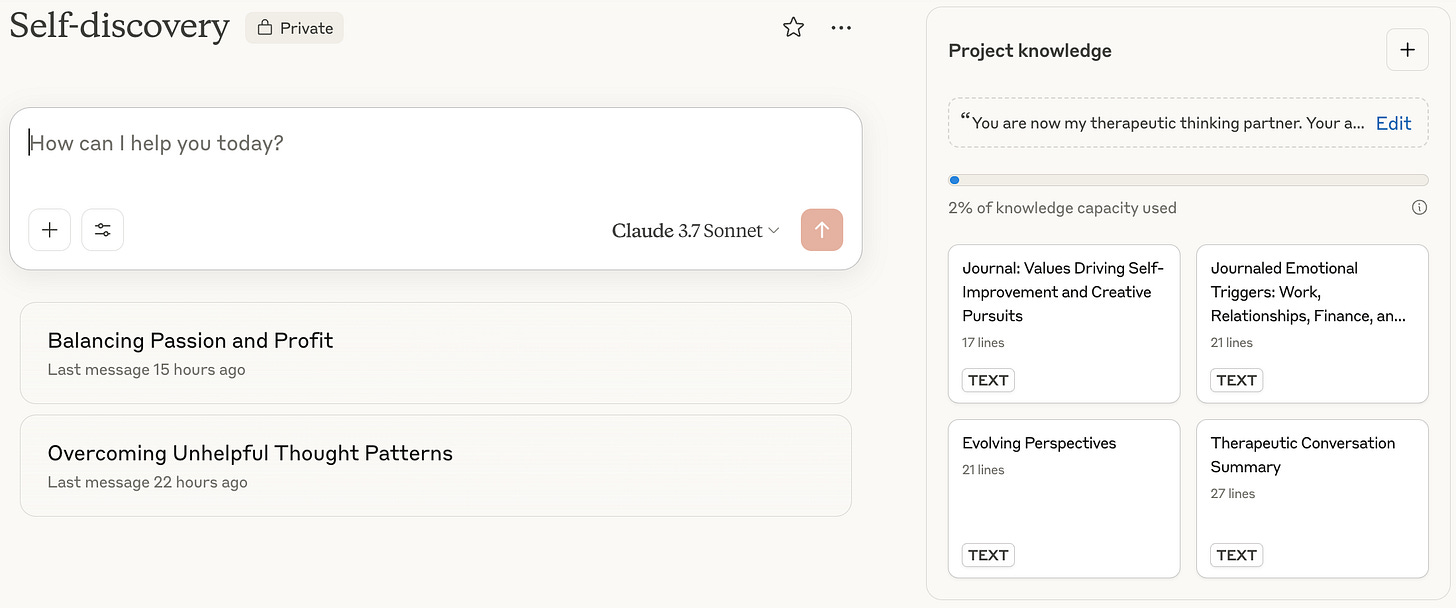
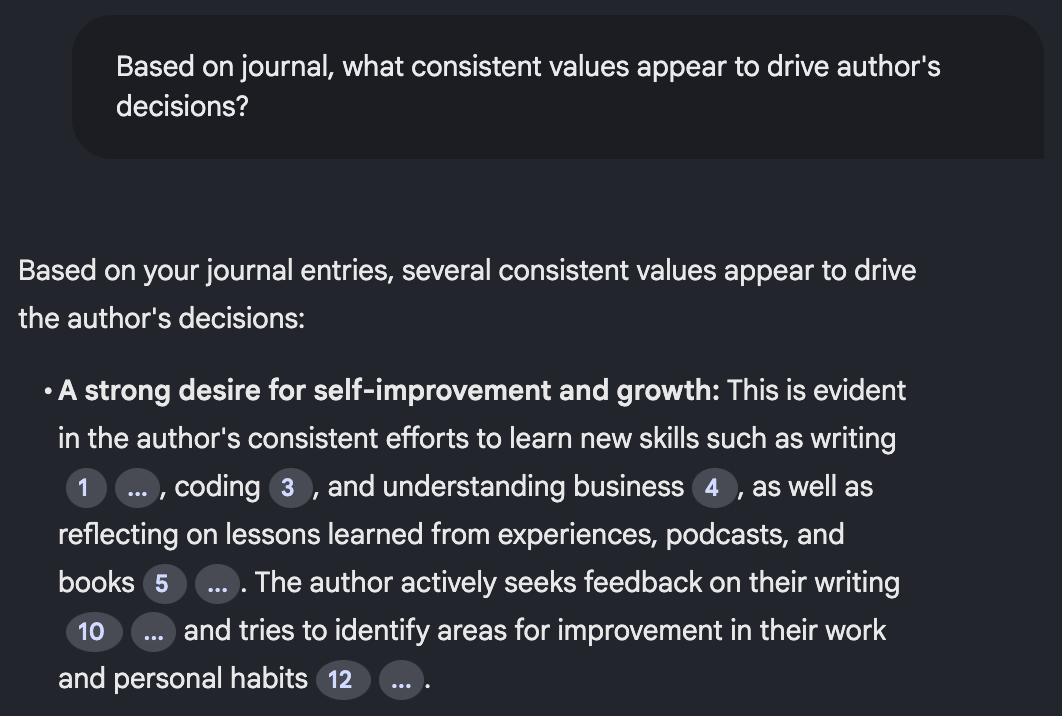

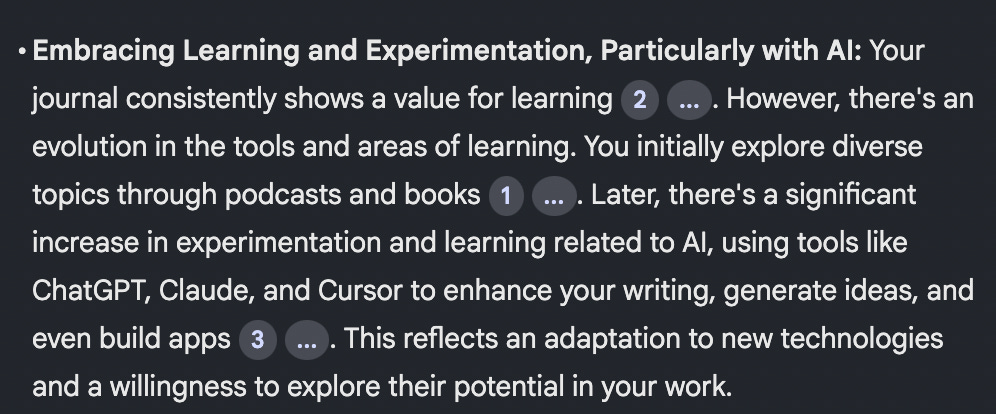
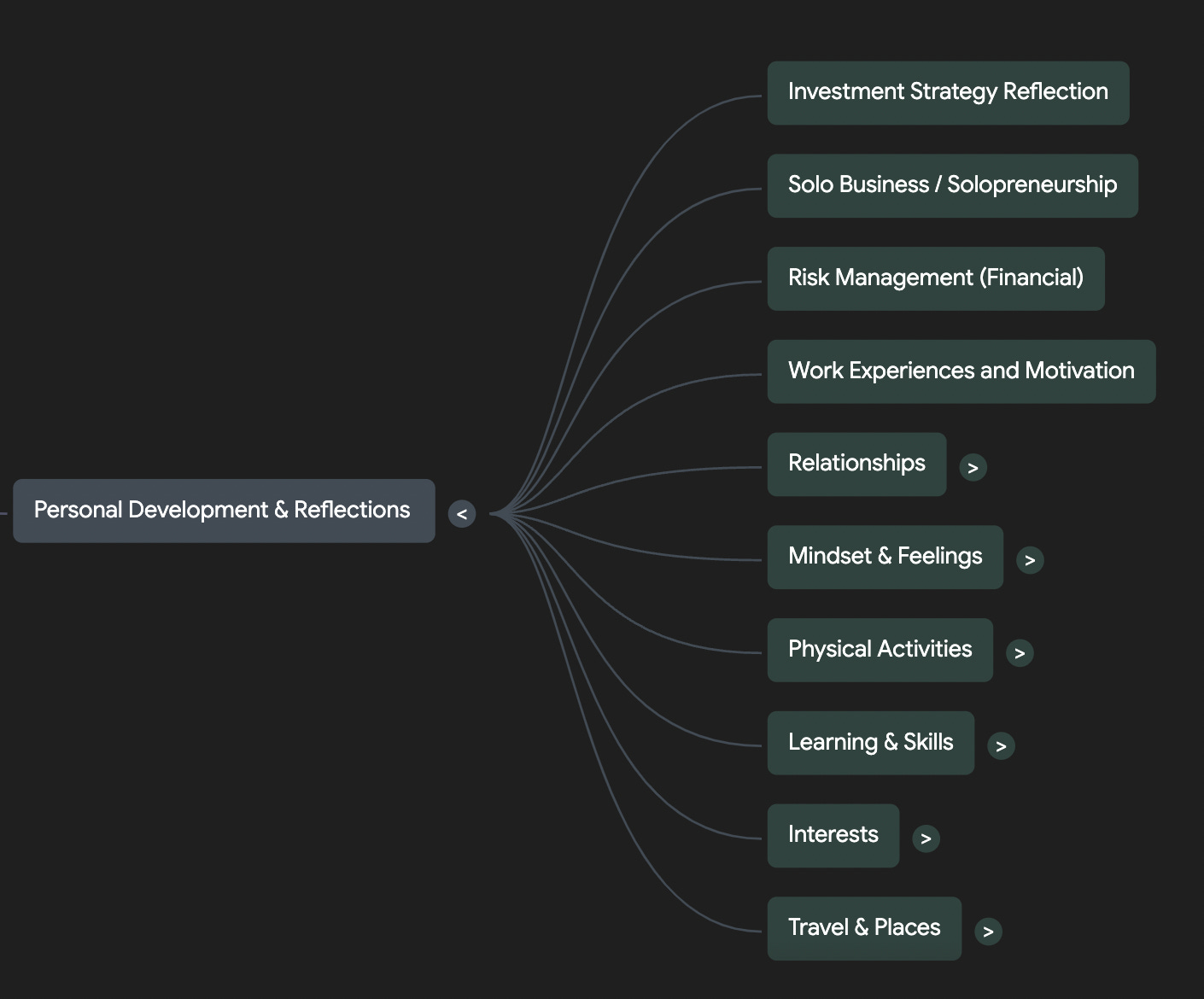
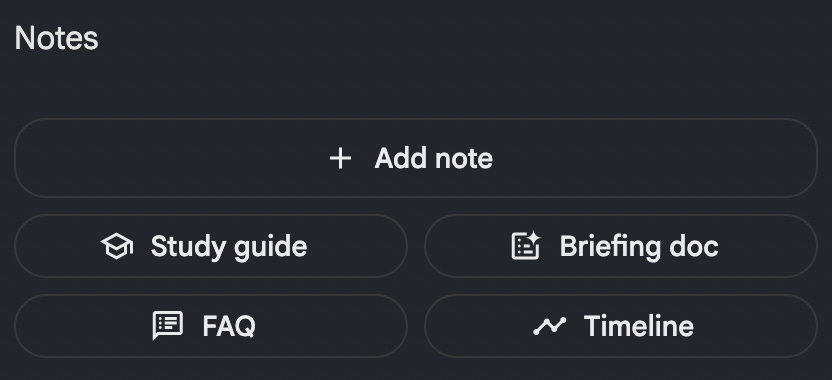
I’ve started exploring Claude and the sense I’m getting is that it’s too positive in regards to nurturing a relationship with me in the sense that every idea I have is amazing. I know better than that LOL.
I did see a couple of articles recently where it’s either been discussed or admitted that it is being designed to emulate what one would hope to hear from it.
My experience so far has been this.
I maintain a healthy amount of skepticism about it. It might be building trust but it’s a type of trust that can be easily manufactured to occur.
I think it's very much worth highlighting that whilst I'm sure there is some great value in this approach, the flipside is that "ChatGPT psychosis" is quickly being seen as a real issue. AI is NOT a safe therapy tool (yet). Vulnerable people can suffer as a result of using it in this way.